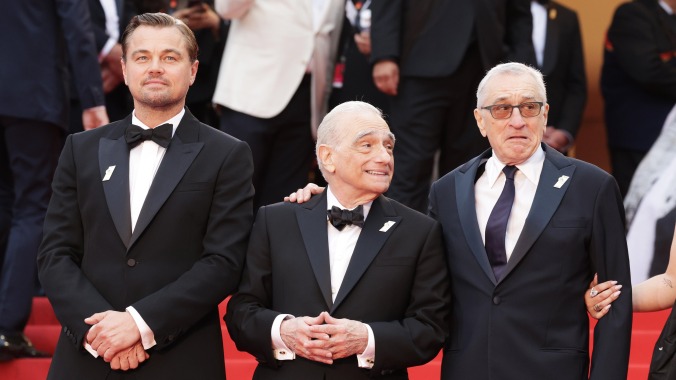De Niro and Scorsese made fun of DiCaprio for "endless" Killers Of The Flower Moon ad-libbing
“Bob and I would look at each other and roll our eyes a little bit. And we’d tell him: ‘You don’t need that dialogue.’”

Martin Scorsese is obviously a pretty big fan of Leonardo DiCaprio, having now cast the actor as the lead in six of his films—including this fall’s Killers Of The Flower Moon. But that affection and appreciation clearly doesn’t preclude getting a little, well, irritated by his star, either, as revealed in a recent conversation Scorsese had with British news source The Telegraph, revealing that DiCaprio’s “endless” ad-libbing on this latest picture began to drive both him and co-star Robert De Niro up the wall.
Correction: “Endless, endless, endless” ad-libbing, which DiCaprio apparently deployed on a regular basis for the scenes between his own character, Ernest Burkhart, and his even-more malevolent uncle, William. (De Niro, by contrast, “Didn’t want to talk.”) Hilariously, it sounds like the two older men (no strangers to collaboration themselves, now on their 10th movie together) would occasionally gang up on the younger man a bit in their efforts to gently curtail the behavior: “Every now and then,” Scorsese told journalists, “Bob and I would look at each other and roll our eyes a little bit. And we’d tell him: ‘You don’t need that dialogue.’”
Scorsese is no stranger to improvisation, of course; he had De Niro improvise some of the biggest moments of Taxi Driver once upon a time, and his entire filmography is shot through with instances of actors bringing their own spins to dialogue and characters. Even so—and given the stature of all three guys—it’s hard not to be charmed by the kid brother energy of the DiCaprio anecdote, the younger star trying to fill the silence being requested by a guy who literally made a movie called Silence. It certainly hasn’t hurt the reception to Killers itself, which—while garnering measured, thoughtful criticisms from the Osage people it depicts—has been getting an almost uniformly warm response from critics.